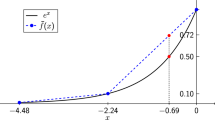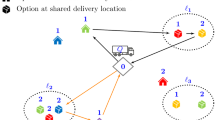Abstract
This paper introduces a bi-objective winner determination problem which arises in the procurement of transportation contracts via combinatorial auctions where bundle bidding is possible. The problem is modelled as a bi-objective extension to the set covering problem. We consider both the minimisation of the total procurement costs and the maximisation of the service-quality level at which the transportation contracts are executed. Taking into account the size of real-world transport auctions, a solution method has to cope with problems of up to some hundred contracts and a few thousand bundle bids. To solve the problem, we propose a bi-objective branch-and-bound algorithm and eight variants of a multiobjective genetic algorithm. Artificial benchmark instances that comply with important economic features of the transport domain are introduced to evaluate the methods. The branch-and-bound approach is able to find the optimal trade-off solutions in reasonable time for very small instances only. The eight variants of the genetic algorithm are compared among each other by means of large instances. The best variant is also evaluated using the small instances with known optimal solutions. The results indicate that the performance largely depends on the initialisation heuristic and suggest also that a well-balanced combination of genetic operators is crucial to obtain good solutions.



Similar content being viewed by others
References
Abrache J, Crainic T, Rekik MGM (2007) Combinatorial auctions. Ann Oper Res 153(34):131–164
Buer T, Pankratz G (2008) Ein pareto-optimierungsverfahren für ein mehrkriterielles gewinnerermittlungsproblem in einer kombinatorischen transportausschreibung. In: Bortfeldt A, Homberger J, Kopfer H, Pankratz G, Strangmeier R (eds) Intelligente Entscheidungsunterstützung. Gabler Verlag, Wiesbaden, pp 113–135
Caplice C, Sheffi Y (2003) Optimization-based procurement for transportation services. J Business Logist 24(2):109–128
Caplice C, Sheffi Y (2006) Combinatorial auctions for truckload transportation. In: Cramton P, Shoaham Y, Steinberg R (eds) (2006) MIT Press, Cambridge, pp 539–571
Cargoclix Dr. Meier & Schmidt GmbH (2010) Success stories. http://www.cargoclix.com/info/en/success-stories/page.html. Last accessed 22 March 2010
Chankong V, Haimes YY (1983) Multiobjective decision making: theory and methodology. Wiley, New York
Cramton P, Shoaham Y, Steinberg R (eds) (2006) Combinatorial auctions, MIT Press, Cambridge, MA
Ehrgott M, Fonseca CM, Gandibleux X, Hao JK, Sevaux M (eds) (2009) Evolutionary multi-criterion optimization, fifth international conference, EMO 2009, Nantes, April 2009, Proceedings, Lecture notes in computer science, vol 5467. Springer
Eiben A, Smith J (2003) Introduction to evolutionary computing. Springer, Berlin
Elmaghraby W, Keskinocak P (2004) Combinatorial auctions in procurement. In: Harrison T, Lee H, Neale J (eds) The practice of supply chain management: where theory and application converge. Springer, New York, pp 245–258
ETH Zurich (2009) ETH Zurich, System optimization, Pisa. ETH Zurich, System Optimization. http://www.tik.ee.ethz.ch/sop/pisa/. Last accessed 30 January 2009
Feo T, Resende M (2005) Greedy randomized adaptive search procedures. J Glob Optim 6:109–133
Haimes Y, Lasdon L, Wismer D (1971) On a bicriterion formulation of the problems of integrated system identification and system optimization. IEEE Trans Syst Man Cybern 1(3):296–297
Hudson B, Sandholm T (2004) Effectiveness of query types and policies for preference elicitation in combinatorial auctions. In: 3rd international joint conference on Autonomous Agents and Multiagent Systems (AAMAS 2004), IEEE Computer Society, Washington, pp 386–393
Ledyard JO, Olson M, Porter D, Swanson JA, Torma DP (2002) The first use of a combined value auction for transportation services. Interfaces 32:4–12
Leyton-Brown K, Shoham Y (2006) A test suite for combinatorial auctions. In: Cramton P, Shoaham Y, Steinberg R (eds) Combinatorial auctions, MIT Press, Cambridge, pp 451–478
Meisell MJ, Norbis M (2008) A review of the transportation mode choice and carrier selection literature. Int J Logist Manag 19(2):183–2111
Nisan N (2000) Bidding and allocation in combinatorial auctions. In: EC ’00: Proceedings of the 2nd ACM conference on Electronic commerce, pp 1–12
Sandholm T, Suri S, Gilpin A, Levine D (2002) Winner determination in combinatorial auctions generalizations. In: International conference on Autonomous Agents and Multi-Agent Systems (AAMAS), Bologna, pp 69–76
Sheffi Y (2004) Combinatorial auctions in the procurement of transportation services. Interfaces 34(4):245–252
Song J, Regan A (2004) Combinatorial auctions for transportation service procurement: the carrier perspective. Transp Res Record 1833:40–46
Suhl L, Mellouli T (2009) Optimierungssysteme—Modelle, Verfahren, Software, Anwendungen. Springer, Berlin
Zitzler E, Thiele L (1999) Multiobjective evolutionary algorithms: a comparative case study and the strength pareto approach. IEEE Trans Evol Comput 3(4):257–271
Zitzler E, Laumanns M, Thiele L (2002) Spea2: improving the strength pareto evolutionary algorithm for multiobjective optimization. In: Giannakoglou K, Tsahalis D, Periaux J, Papailiou K, Fogarty T (eds) Proceedings of the EUROGEN2001 conference, CIMNE, Barcelona, pp 95–100
Zitzler E, Thiele L, Laumanns M, Fonseca CM, da Fonseca VG (2003) Performance assessment of multiobjective optimizers: An analysis and review. IEEE Trans Evol Comput 7:117–132
Author information
Authors and Affiliations
Corresponding author
Rights and permissions
About this article
Cite this article
Buer, T., Pankratz, G. Solving a bi-objective winner determination problem in a transportation procurement auction. Logist. Res. 2, 65–78 (2010). https://doi.org/10.1007/s12159-010-0031-8
Received:
Accepted:
Published:
Issue Date:
DOI: https://doi.org/10.1007/s12159-010-0031-8




